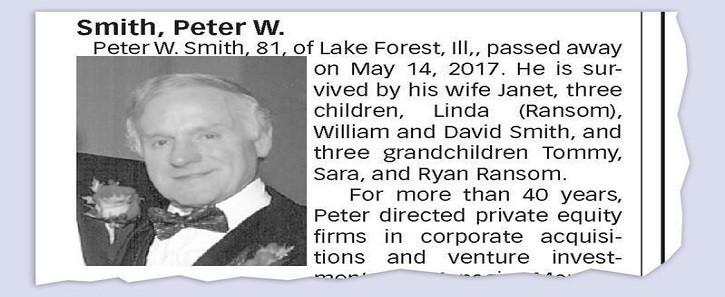

The Final Confession of Peter W. Smith


I first ran into Peter W. Smith—that crafty master of the dark side of oppo research—in the early 1990s. The Chicago financier was spreading around a lot of money in Arkansas to support investigations into allegations that Arkansas state troopers were pimping for Gov. Bill Clinton. I didn’t take any of Mr. Smith’s money but state troopers, lawyers and a young reporter named David Brock did. “Troopergate” came to nothing, except that Brock wrote a story in the American Spectator that smeared a woman named “Paula,” which led to the Paula Jones sexual harassment lawsuit, which led to the impeachment of William Jefferson Clinton. So from a GOP oppo perspective, the mission was a roaring success. Thanks in large part to Peter W. Smith.
In the years that followed, plenty of folks on the Right took Mr. Smith’s money—he was a generous and inquisitive man, well known and well connected. On May 14, he committed suicide in a Rochester, Minnesota, hotel room near the Mayo Clinic. He was 81. He left a note stating “NO FOUL PLAY WHATSOEVER,” according to the Chicago Tribune, citing a “bad turn” in his health in recent months and an expiring $5 million life insurance policy.
Before he died, however, Mr. Smith carefully prepared what amounts to a deathbed confession—a final piece of oppo research lofted into the Russian connection case from beyond the grave. The delivery vehicle for the final confession of Peter W. Smith was Shane Harris of the Wall Street Journal. Mr. Harris spoke with Mr. Smith ten days before his death.
On June 29, Mr. Harris reported that Mr. Smith in the months before the 2016 presidential election “mounted an independent campaign to obtain emails he believed were stolen from Hillary Clinton’s private server, likely by Russian hackers.”
Oppo researchers chasing the Clinton emails is not news. But the Journal story included two significant items.
First, according to the Journal, Mr. Smith repeatedly “implied he was working with retired Lt. General Michael Flynn, at the time a senior adviser to then-candidate Donald Trump.” If true, that puts Mr. Flynn at a nexus between Russian hackers and the Trump campaign.
Second, the Journal story suggests that intelligence agencies may be connecting dots between Russian hackers and Mr. Flynn. It cites “reports from intelligence agencies that describe Russian hackers discussing how to obtain emails from Mrs. Clinton’s server and then transmit them to Mr. Flynn via an intermediary.”
That’s a bombshell dropped into the middle of the story, although the sourcing is arms-length and not reassuring. Here’s the full quote. “The operation Mr. Smith described is consistent with information that has been examined by U.S. investigators probing Russian interference in the elections. Those investigators have examined reports from intelligence agencies that describe Russian hackers discussing how to obtain emails from Mrs. Clinton’s server and then transmit them to Mr. Flynn via an intermediary, according to U.S. officials with knowledge of the intelligence.”
Mr. Smith described assembling a team of tech experts, lawyers and a Russian-speaking investigator to locate the 33,000 personal emails he believed to have been stolen from Mrs. Clinton’s private server. The story from the Clinton camp, of course, is that the 33,000 emails were deleted because they concerned “personal,” not State Department, matters. Mr. Smith said his team found five groups of hackers, including two groups thought to be Russians, who claimed to have the emails
A day after the Journal piece ran, information security specialist Matt Tait confirmed the broad contours of the story. Writing at Lawfare, Mr. Tait said that Mr. Smith had contacted him, saying he was in touch with a hacker from the “Dark Web” who claimed to have copies of Mrs. Clinton’s deleted emails. Mr. Smith wanted Mr. Tait to authenticate the emails. Several conversations with Mr. Smith and an associate ensued. Mr. Tait, uneasy about the situation, never got to see the emails, but writes that “it was immediately apparent that Smith was both well connected with the top echelons of the campaign and seemed to know both Lt. Gen. Flynn and his son well. Smith routinely talked about the goings on at the top of the Trump team, offering deep insights.”
The Journal story has a lot of gaps. There’s no evidence that Mr. Smith was an “intermediary” between Russian hackers and the Trump campaign. There’s no evidence that Mr. Flynn even knew Mr. Smith. (Mr. Flynn did not respond to Journal requests for comments.) There’s no evidence that Mrs. Clinton’s 33,000 “personal” emails were ever obtained by hackers. And there’s no proof that those “Russian hackers” Mr. Smith believed he discovered were hackers or even Russians, but instead may have been criminals looking to separate a mark from his money.
But here are a few things to remember about Peter W. Smith. He was not an amateur at this game. And for decades, doors at the highest levels of the GOP had opened for him. And one of the very last things he wanted to do in life was get a message out about the Russian connection. I wonder why.
***
Micah Morrison is chief investigative reporter for Judicial Watch. Follow him on Twitter @micah_morrison. Tips: [email protected]
Investigative Bulletin is published weekly by Judicial Watch. Reprints and media inquiries: [email protected]















